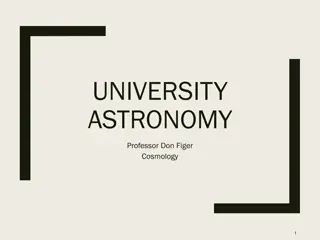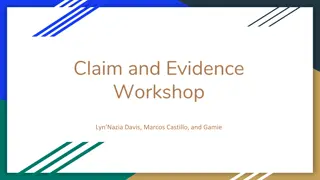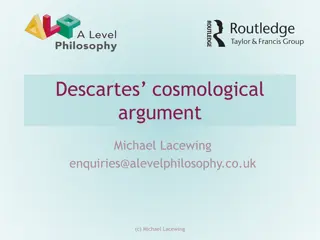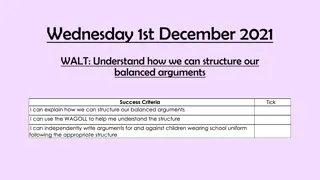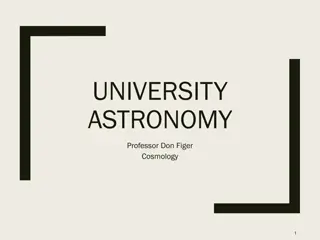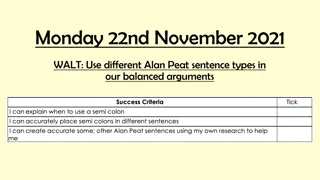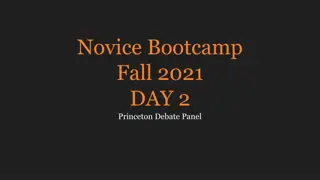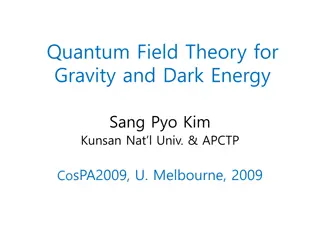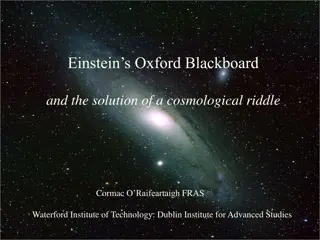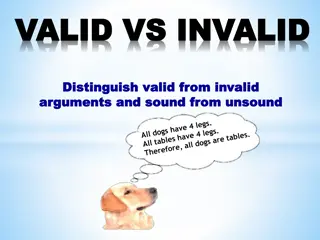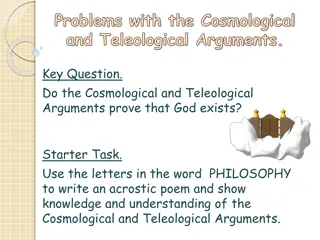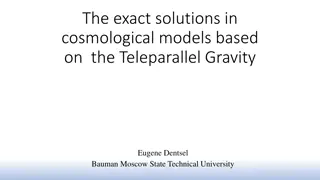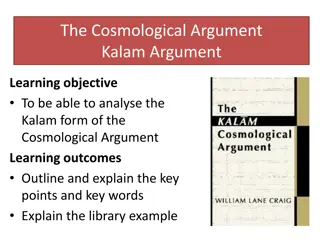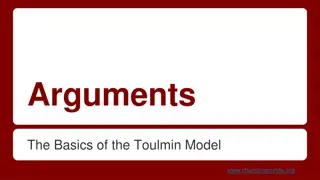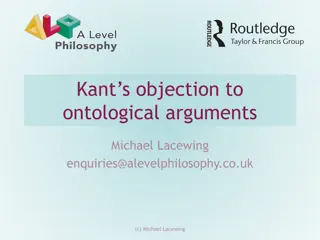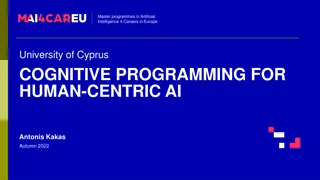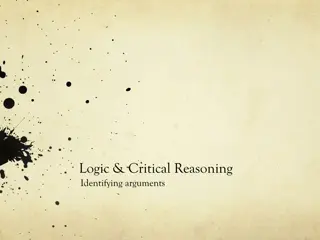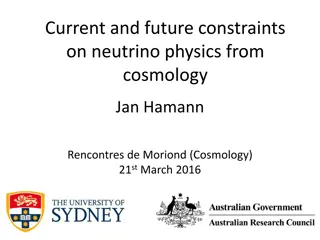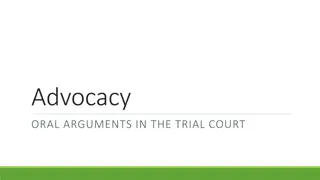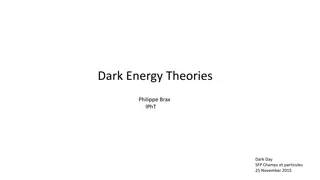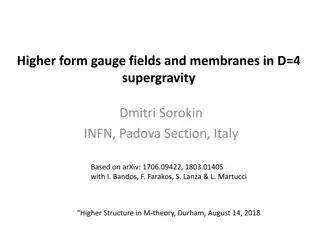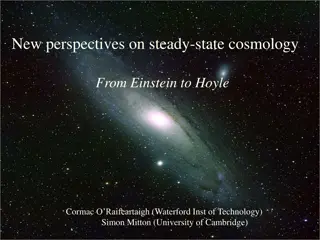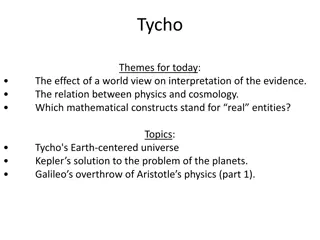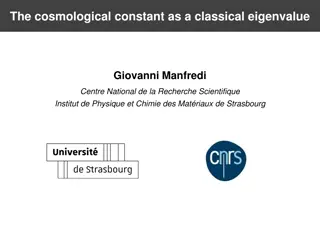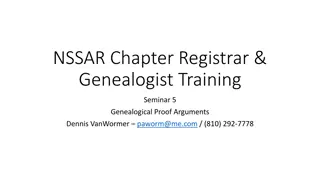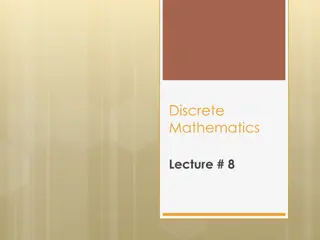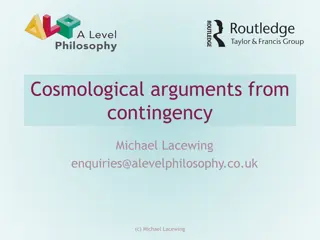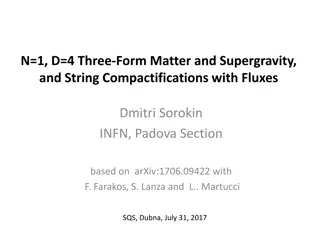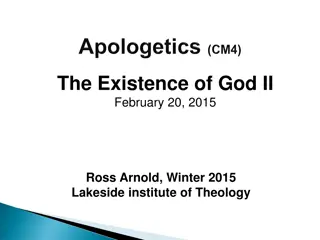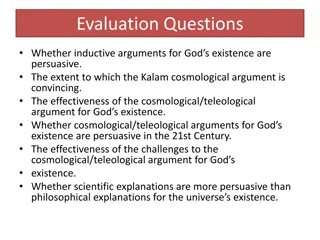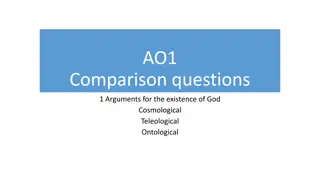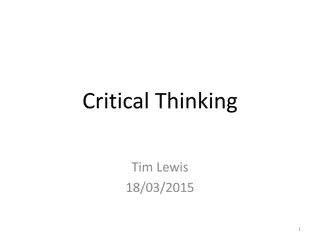UNIVERSITY ASTRONOMY
Delve into the fascinating realm of cosmology as we unravel the mysteries of the Universe, from its origins with the Big Bang theory to the accelerating expansion and potential fate of the cosmos. Discover the history of cosmological thought, from Aristotle to Newton, and ponder profound questions a
0 views • 50 slides
Mastering the Toulmin Method for Constructing Persuasive Arguments
Learn how to effectively structure arguments using the Toulmin Method, which consists of Claim, Data, Warrant, Backing, Counterclaim, and Rebuttal elements. Explore reasoning and logic concepts, differentiate between inductive and deductive reasoning, and understand how to construct valid arguments
0 views • 30 slides
Descartes' Cosmological Argument and Existence Inquiry
Descartes presents a cosmological argument questioning the existence of anything, focusing on what causes his own existence. He explores different aspects such as perfection, dependency, and the idea of God as a necessary cause for existence. Challenges about the nature of continued existence are al
0 views • 17 slides
Understanding the Structure of Balanced Arguments
Explore the concept of using the third person in writing balanced arguments to maintain objectivity and structure. Learn about third person pronouns and the importance of being unbiased in your writing. Understand the significance of structuring your arguments and maintaining a clear order for effec
0 views • 11 slides
Exploring Cosmology: A Journey Through the Universe's Mysteries
Delve into the fascinating field of cosmology with Professor Don Figer as he unravels the big bang theory, cosmological observations, and ponders the fate of the Universe. Learn about the origins of cosmology, its elements, history from Aristotle to Newton, and the evolution of our understanding of
0 views • 56 slides
Mastering Alan Peat's Balanced Arguments with Different Sentence Types
Explore the use of various Alan Peat sentence types in crafting balanced arguments, focusing on incorporating semi-colons effectively. Engage in interactive activities and practice sessions to enhance your skills in creating compelling arguments. Dive into examples and exercises to refine your under
2 views • 12 slides
Mastering Debate: Essential Strategies and Techniques
Learn key concepts like argument structure, points of clarification, and how to make compelling arguments in a debate setting. Discover the importance of warrants, impacts, and implications in formulating strong arguments. Explore tips on coming up with effective arguments and understanding differen
0 views • 47 slides
Mastering Final Focus in Debates
Final Focus, a crucial 2-minute speech at the end of a debate, serves as your last chance to persuade the judge of your victory. It involves comparing key voters and emphasizing the impact of your arguments. Weighing key voters is essential, with a focus on demonstrating why the scale tips in your f
1 views • 4 slides
Exploring Quantum Field Theory for Gravity and Dark Energy
Delve into the fascinating realms of quantum field theory as applied to gravity and dark energy, unraveling the mysteries of the universe through concepts like vacuum energy, cosmological constants, and dark energy models. Discover the interconnected web of theories concerning the early universe, in
0 views • 27 slides
Understanding Reasonable Arguments vs. Pseudo-Arguments
The provided content focuses on distinguishing between reasonable arguments and pseudo-arguments through thought-provoking questions such as the ethical treatment of animals, city subsidies for sports venues, and subjective opinions on aesthetics. It also explains the structure of an argument, highl
0 views • 18 slides
Einstein's Oxford Blackboard: Unraveling the Cosmos in 1931
Einstein's lectures in Oxford in 1931, focusing on his blackboard model of the cosmos, shed light on anomalies in his previous work and marked a pivotal moment in 20th-century science. This glimpse into Einstein's views of Oxford and his interactions with the academic community gives insight into hi
4 views • 14 slides
Understanding Valid and Invalid Arguments in Logic
In logic, arguments consist of premises supporting a conclusion, with deductive arguments claiming logical necessity. Valid arguments have premises implying the conclusion, making them deductively valid. For example, if all actors are robots and Tom Cruise is an actor, then logically Tom Cruise must
0 views • 25 slides
Exploring Problems with Cosmological and Teleological Arguments
Dive into the challenges faced by the Cosmological and Teleological Arguments in proving the existence of God. Explore key questions, acrostic poems, lesson outcomes, and activities to deepen your understanding of these philosophical concepts. Discover how scientific theories like the Big Bang Theor
0 views • 6 slides
An Examination of Ontological Arguments for God's Necessary Existence
Various ontological arguments, such as Malcolm's and Anselm's, propose that the existence of God is logically necessary, grounded in the concept of God as the greatest possible being. These arguments challenge the coherence of the concept of God and counter objections, like Kant's claim that existen
2 views • 10 slides
Exact Solutions in Cosmological Models Based on Teleparallel Gravity
Precision in cosmological models based on teleparallel gravity is explored, including fundamental theories, modifications, and applications in the context of General Relativity. The construction principles of GR modifications, characteristic tensors, relation between different metric-affine geometri
0 views • 17 slides
Understanding the Kalam Argument in the Cosmological Debate
The Kalam Argument, a form of the Cosmological Argument, asserts that everything with existence has a cause, including the universe. Developed by thinkers like al-Kindi, al-Ghazali, and William Lane Craig, it aims to prove that God was the initial cause of the universe. This argument suggests that t
0 views • 17 slides
Understanding the Toulmin Model for Effective Argumentation
The Toulmin Model provides a structured approach to crafting and evaluating arguments, consisting of key components like claims, grounds/data, and warrants. It emphasizes the importance of using evidence and reasoning to support claims effectively. By understanding this model, one can enhance the pe
0 views • 13 slides
Kant's Critique of Ontological Arguments
An exploration of Kant's objection to ontological arguments, examining the flaws in the reasoning of Anselm and Descartes. Kant argues that existence is not a predicate and does not enhance the concept of a being. Therefore, ontological arguments cannot prove the existence of God solely through conc
0 views • 7 slides
Understanding Argumentation and Realization in AI Master Programmes
Exploring the concept of argumentation and its realization in artificial intelligence master programmes, focusing on the construction, evaluation, and implementation of arguments through cognitive programming. The framework involves structured argumentation, conflict relations, and strength/preferen
1 views • 31 slides
Understanding Logic and Critical Reasoning: Identifying Arguments
In the study of logic and critical reasoning, identifying arguments is a fundamental task. Arguments consist of premises supporting a conclusion, and they can be identified by specific indicators and techniques. Understanding argument structure and types of support, such as deductive and inductive,
2 views • 15 slides
Neutrino Mysteries Unveiled: Current Cosmological Constraints
Delve into the enigmatic world of neutrinos with a focus on their elusive properties like mass hierarchy, additional light neutrinos, and impact on cosmic background. Explore the unresolved questions surrounding neutrino physics from cosmological perspectives.
0 views • 29 slides
Guide to Oral Arguments in Trial Court
Learn how to conduct oral arguments in a trial court, including the steps for both the movant and respondent, strategies for making strong arguments, and tips for responding effectively. This comprehensive guide covers the dos and don'ts of oral arguments, emphasizing the importance of preparation,
0 views • 9 slides
Understanding Dark Energy Theories and Cosmological Dynamics
Exploring the concept of dark energy and its implications in the acceleration of the Universe. Various theories, including cosmological constants, vacuum energy, and modifications of General Relativity, are discussed. The role of vacuum fluctuations, gravitational coupling, and the challenges in des
4 views • 29 slides
Higher-Form Gauge Fields and Membranes in D=4 Supergravity
This study focuses on higher-form gauge fields and membranes in D=4 supergravity, exploring their role in cosmological constant generation and membrane nucleation. The dynamics of three-form gauge fields, their coupling to gravity and membranes, and implications for cosmological models and supersymm
0 views • 17 slides
Supporters of Slavery in the 19th Century: Legal, Religious, and Economic Arguments
In the 19th century, defenders of slavery utilized legal arguments by denying citizenship rights to blacks, religious arguments by justifying ownership and guidance through biblical references, and economic arguments by comparing treatment of slaves in the South to conditions of workers in the North
0 views • 4 slides
Understanding Command-line Arguments and Errors
Learn how to utilize command-line arguments in Python scripts to enhance flexibility and parametrize functions for various inputs. Explore ways to access and utilize command-line arguments effectively, while handling errors gracefully.
0 views • 30 slides
Revisiting Steady-State Cosmology: From Einstein to Hoyle
Explore the historical evolution of cosmological models from Einstein's steady-state theory to the Big Bang hypothesis, examining key figures, discoveries such as Hubble's law, and debates about the universe's expansion. The article delves into Einstein's contributions, the challenges of integrating
0 views • 18 slides
Analyzing Arguments in English Debates: A Critical Approach
Explore and critique various arguments presented in English debates, including topics like dietary recommendations, digestion issues with Japanese rice, and driving skills in different weather conditions. Learn how to evaluate evidence, causality, and persuasiveness in arguments to develop critical
0 views • 19 slides
Mastering Academic Writing Moves: The Art of Summarizing
In academic writing, mastering the art of summarizing is crucial for persuasive arguments. By engaging in dialogue with others and summarizing their arguments, writers can strengthen their position. It is important to strike a balance between the original author's ideas and your own, emphasizing asp
0 views • 15 slides
An Overview of Debate: Propositions, Teams, and Formats
Debate is a regulated discussion between two matched sides discussing a proposition, with the affirmative arguing for change and the negative defending the status quo. The standard debate format involves constructive arguments followed by rebuttals from both sides. The roles in a debate include the
0 views • 47 slides
The Evolution of Cosmological Models: Tycho vs. Copernicus
Explore the historical debate between Tycho Brahe's Earth-centered universe and Copernicus's heliocentric model, focusing on the impact of worldviews on interpreting evidence, the relationship between physics and cosmology, and the role of mathematical constructs in representing real entities. Disco
0 views • 19 slides
Exploring the Cosmological Constant as a Classical Eigenvalue
The concept of the cosmological constant, its implications in the standard cosmological model, and its relation to dark energy are discussed in this scientific exploration. The discussion delves into whether the cosmological constant is truly constant or varies in space and time, and its role in gra
0 views • 10 slides
Genealogical Proof Arguments and SAR Standard of Proof
This detailed content covers the definitions and components of genealogical proof arguments, proof summaries, and the SAR standard of proof. It explains the importance of evidence quality, source citations, and analysis in establishing acceptable genealogical conclusions for SAR membership applicati
0 views • 22 slides
Understanding Valid and Invalid Arguments in Discrete Mathematics
Concepts of valid and invalid arguments in discrete mathematics are explored through examples. Learn how to determine the validity of arguments based on premises and conclusions. Practice using truth tables to evaluate argument forms. Enhance your logical reasoning skills in Discrete Mathematics.
0 views • 22 slides
Cosmological Arguments from Contingency Explained
Explore the concept of necessary and contingent existence, Aquinas' Third Way argument for the existence of God, objections to the causal principle, and the idea of a series of contingent things. Contemplate the question of why anything exists and whether God provides the answer.
0 views • 16 slides
Three-Form Matter and Supergravity in String Compactifications
Investigating the role of 3-form gauge fields in N=1, D=4 supergravity and matter supermultiplets, exploring their connection to cosmological constant, neutralization mechanisms, and susy breaking. The duality between 3-form fields and cosmological constant is discussed, along with a novel supersymm
0 views • 13 slides
Philosophical Apologetics: Arguments for the Existence of God
Philosophical apologetics presents various arguments for the existence of God, including the ontological, cosmological, teleological, moral, transcendental, and presuppositional arguments. These arguments cover diverse aspects such as change, causality, design, contingency, miracles, consciousness,
0 views • 10 slides
Evaluating Arguments for God's Existence in the 21st Century
Exploring the persuasiveness of inductive arguments for God's existence, assessing the Kalam cosmological argument, and evaluating the effectiveness of cosmological/teleological arguments. Delving into whether scientific explanations surpass philosophical ones, the strengths and weaknesses of these
0 views • 16 slides
Comparison of Arguments for the Existence of God
The comparison explores the Cosmological, Teleological, and Ontological arguments for the existence of God. It delves into the similarities and differences between key proponents such as Aquinas, Paley, William Lane Craig, and Tennant. Each argument is examined based on its form, empirical evidence,
0 views • 10 slides
Understanding Critical Thinking, Hypotheses, and Arguments
Explore the concepts of critical thinking, hypotheses, and arguments in this informative content. Learn about the definition of hypotheses, the nature of arguments, and syllogisms. Delve into the world of logical reasoning and the foundations of thought processes.
0 views • 32 slides
